_Module2_语法
外研社九年级上册英语-Module-2-词汇与语法基础(解析版)-(2)

精品文档-可编辑一、必背词汇f o u n d[f aʊn d]v.创立,创建f l a g[f læg]n.旗,旗帜u n t i l[ənˈtɪl]p r e p.&c o n j.直到…为止o f f[ɒf]a d v.不上课,休息,不工作v a c a t i o n[vəˈk eɪʃn]n.假期,假日s e a s o n[ˈs i:z n]n.度假旺季,节期k i d[kɪd]n.小孩b a n d[bæn d]n.乐队U K[ˌj u:'k eɪ]英国f o u r t h[fɔ:θ]n u m.第四s i x t h[sɪk sθ]n u m.第六s e v e n t h[ˈs e v nθ]n u m.第七e i g h t h[eɪtθ]n u m.第八n i n t h[n aɪnθ]n u m.第九t e n t h[t e nθ]n u m.第十t w e l f t h[t w e l fθ]n u m.第十二t w e n t i e t h['t w e n tɪəθ]n u m.第二十a m o n g[əˈmʌŋ]p r e p.在…之中s p e e c h[s p i:tʃ]n.演说,讲演p i o n e e rˌ[p aɪəˈnɪə]n.开拓者,先驱者g r o w[g rəʊ]v.种植,栽培(植物)c o r n[kɔ:n]n.谷物,玉米f o l l o w i n g[ˈfɒləʊɪŋ]a d j.接着的,接下来的l a y(l a i d,l a i d)[l eɪ]v.摆放(餐桌)o v e r[ˈəʊvə]a d j.完了的,结束的d i s h[dɪʃ]n.盘,碟p a r a d e[pəˈr eɪd]n.(庆祝)游行o u r s e l v e s[ɑ:ˈs e l v z]p r o n.我们自己二、重点词汇1.f o u n d[f aʊn d]v.t o b r i n g s o m e t h i n g i n t o e x i s t e n c e创建;创立;创办例句:R o m e w a s f o u n d e d i n t h e e i g h t h c e n t u r y B C.罗马是公元前8世纪创建的。
外研版英语必修二重点短语、句型、语法汇总(Module2)
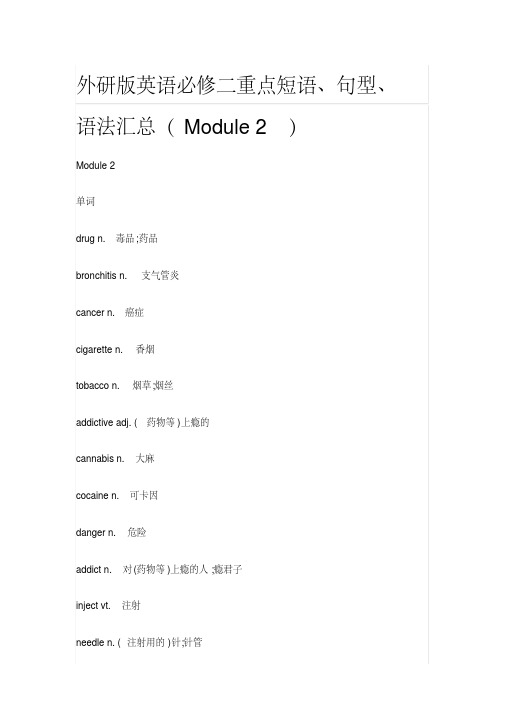
外研版英语必修二重点短语、句型、语法汇总(Module 2)Module 2单词drug n. 毒品;药品bronchitis n. 支气管炎cancer n. 癌症cigarette n. 香烟tobacco n. 烟草;烟丝addictive adj. (药物等)上瘾的cannabis n. 大麻cocaine n. 可卡因danger n. 危险addict n. 对(药物等)上瘾的人;瘾君子inject vt. 注射needle n. (注射用的)针;针管powerful adj. 有力的;(药等)有功效的reduce vt. 减少nearby adj. 附近的burglary n. 盗窃;窃案;盗窃罪crime n. 罪行;犯罪行为criminal n. 罪犯connection n. 联系;关系;关联illegal adj. 违法的;不合法的ratio n. 比;比率shoplifting n. 逛商店时偷窃商品的行为treatment n. 治疗likely adj. 可能的adult n. 成人cafe n. 咖啡馆;餐馆disagree vi. 不同意;意见不合ban vt. 禁止horrible adj. 令人不快的;极讨厌的affect vt. 影响;对……有坏影响participant n. 参与者;参加者recognise vt. 认识;认知;认出leaflet n. 传单;印刷品distraction n. 分心;分散注意力jogging n. 慢跑gymnastic adj. 体操的related to 有关系的;有关联的break into 破门而入;强行闯入belong to 属于become addicted to 对……上瘾;沉迷于take one’s advice 听某人的意见in order to 为了……so as to 为了……give up 戒除;放弃短语1 be/become/get addicted to sth. 对某物上瘾2 be in danger处于危险之中3 be out of danger 脱离危险4 ban sb from doing sth.禁止某人做某事ban doing禁止做某事5 There is a ban on…有一个关于…禁令6 affect=have an effect on…对……有影响influence=have an influence on7. No point (in) doing sth 做某事没有意义8 Develop interests in sth 培养…方面的兴趣9.break into a house 破门而入10.break into tears 大哭起来11. be related to sb. 与某人有关系/关联12.take/follow one’s advice 听从某人建议give sb some advice on sth. 就某事向某人建议13.in order to(用于句首,句中), so as to(用于句中) 为了,以便14.give up (doing) sth放弃15.share…with sb…和sb分享…pare…to…把…比如…pare…with…把…和…做比较compared with/to 与…比18.do/make a survery 做一个调查19.make a list of 列一个名单20.stop sb from doing =keep sb from doing=prevent sb from doing阻止sb做某事21. against the law 违法break the law 违法obey the law 守法22. under medical treatment 在治疗中23.continue to do=continue doing 继续做24.offer sb sth=offer sth to sb 向sb提供sth25.cause many deaths 导致许多人死亡26.illnesses (which are)related to smoking和吸烟有关的疾病27.die of hunger 死于饥饿28.die from an accident死于一起事故29. This is my treat .我请客treat sb. to sth.用某物款待某人treat sb .as …把某人视为…30.a heart attack 一次心脏病发作31.ask sb for money 向sb要钱32.be in pain 处于痛苦之中33.take sth. to sp. 把某物带到某地34.leave school 辍学,离开学校35.mind doing 介意做36.in public当众地37.the public 公众38.set/fix a date确定一个日期39.increase to增加到…40.increase by…增加了41.by this time 到这时为止42.during the 1990s二十世纪九十年代in the 1990’s / 1990s43. inject …into 注入44. reduce to 减少到reduce by 减少了45.I couldn’t agree more 我再同意不过了.46. That’s a good point. 有道理To the point 切题47. participate in 参与48. distract from 分心语法归纳1.addict v./n. addiction adj. addictive /addicted①Adam Rouse used to be a drug addict(瘾君子)②He is now fighting against his cocaine addiction(瘾)③Heroin is highly addictive(使人上瘾的)④Her son is addicted to(沉迷于) computer games.⑤Cocaine is a powerfully addictive(使人上瘾的)drug.⒉likely adj. 可能的;有希望的, 适合的adv. 或许, 可能It is likely that... 很可能... = It’s probable/ possible that…sb./sth. be likely to do很可能做…= It is possible for sb./sth. to do …Not likely!不可能! 才不呢! (强调否认或拒绝)①They are the likeliest candidates. 他们是最有可能当选的候选人。
Module2知识点详解-挖空-2022-2023学年人外研版八年级英语下册
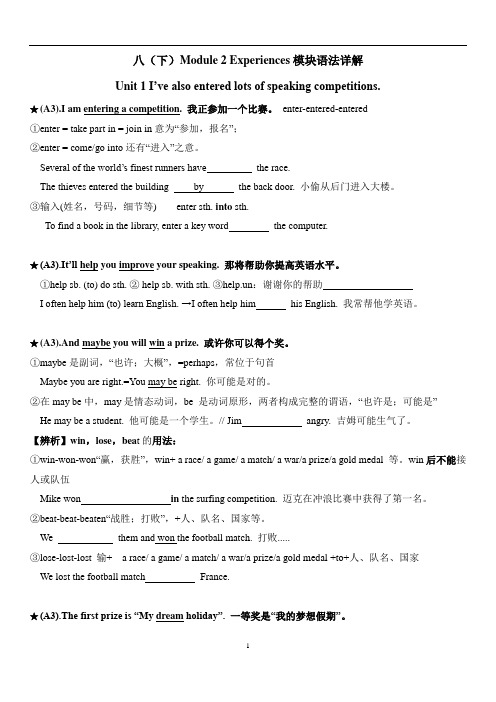
八(下)Module 2 Experiences模块语法详解Unit 1 I’ve also entered lots of speaking competitions.★(A3).I am entering a competition. 我正参加一个比赛。
enter-entered-entered①enter = take part in = join in意为“参加,报名”;②enter = come/go into还有“进入”之意。
Several of the world’s finest runners have the race.The thieves entered the building by the back door. 小偷从后门进入大楼。
③输入(姓名,号码,细节等) enter sth. into sth.To find a book in the library, enter a key word the computer.★(A3).It’ll help you improve your speaking. 那将帮助你提高英语水平。
①help sb. (to) do sth. ② help sb. with sth. ③help.un:谢谢你的帮助I often help him (to) learn English. →I often h elp him his English. 我常帮他学英语。
★(A3).And maybe you will win a prize. 或许你可以得个奖。
①maybe是副词,“也许;大概”,=perhaps,常位于句首Maybe you are right.=You may be right. 你可能是对的。
②在may be中,may是情态动词,be 是动词原形,两者构成完整的谓语,“也许是;可能是”He may be a student. 他可能是一个学生。
外研社八年级下册英语:Module 2 重点知识、语法练习(有答案)
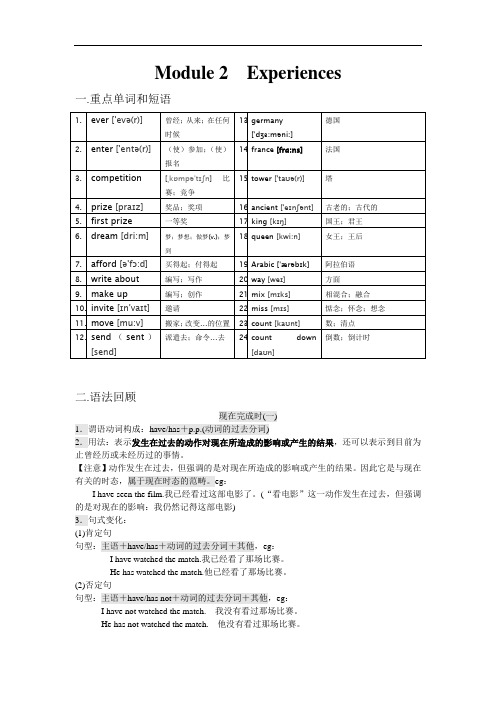
Module 2 Experiences一.重点单词和短语二.语法回顾现在完成时(一)1.谓语动词构成:have/has+p.p.(动词的过去分词)2.用法:表示发生在过去的动作对现在所造成的影响或产生的结果,还可以表示到目前为止曾经历或未经历过的事情。
【注意】动作发生在过去,但强调的是对现在所造成的影响或产生的结果。
因此它是与现在有关的时态,属于现在时态的范畴。
eg:I have seen the film.我已经看过这部电影了。
(“看电影”这一动作发生在过去,但强调的是对现在的影响:我仍然记得这部电影)3.句式变化:(1)肯定句句型:主语+have/has+动词的过去分词+其他,eg:I have watched the match.我已经看了那场比赛。
He has watched the match.他已经看了那场比赛。
(2)否定句句型:主语+have/has not+动词的过去分词+其他,eg:I have not watched the match.我没有看过那场比赛。
He has not watched the match.他没有看过那场比赛。
(3)一般疑问句句型:Have/Has+主语+动词的过去分词+其他?肯定回答:Yes,主语+have/has.否定回答:No,主语+haven't/hasn't. eg:—Have you watched the match?你看那场比赛了吗?—Yes,I have./No,I haven't.是的,我看了。
/不,我没看。
—Has he watched the match?他看那场比赛了吗?—Yes,he has./No,he hasn't.是的,他看了。
/不,他没看。
4.动词过去分词的构成:(1)规则动词①大多数动词直接在后面加-ed。
work →worked cook →cooked②以e结尾的动词需加-d。
外研社七年级上册英语 Module 2 词汇和语法基础(解析版) (2)
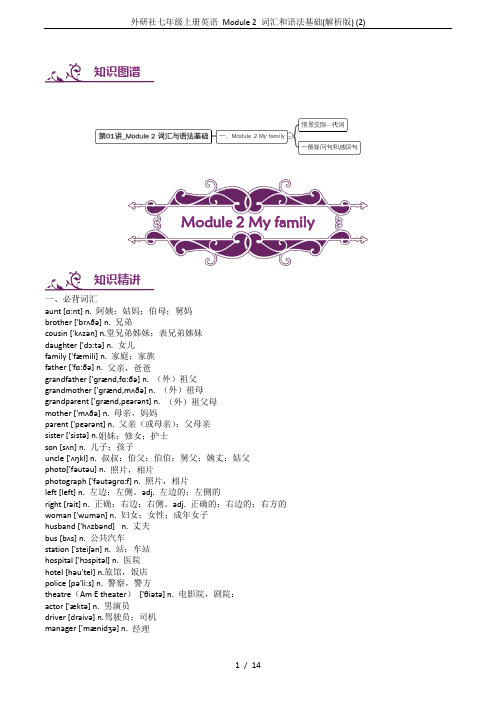
知识图谱Module 2 My family知识精讲一、必背词汇aunt [ɑ:nt] n. 阿姨;姑妈;伯母;舅妈brother ['brʌðə] n. 兄弟cousin ['kʌzən] n.堂兄弟姊妹;表兄弟姊妹daughter ['dɔ:tə] n. 女儿family ['fæmili] n. 家庭;家族father ['fɑ:ðə] n. 父亲,爸爸grandfather ['ɡrænd,fɑ:ðə] n. (外)祖父grandmother ['ɡrænd,mʌðə] n. (外)祖母grandparent ['ɡrænd,pεərənt] n. (外)祖父母mother ['mʌðə] n. 母亲,妈妈parent ['pεərənt] n. 父亲(或母亲);父母亲sister ['sistə] n.姐妹;修女;护士son [sʌn] n. 儿子;孩子uncle ['ʌŋkl] n. 叔叔;伯父;伯伯;舅父;姨丈;姑父photo['fəutəu] n. 照片,相片photograph ['fəutəɡrɑ:f] n. 照片,相片left [left] n. 左边;左侧。
adj. 左边的;左侧的right [rait] n. 正确;右边;右侧。
adj. 正确的;右边的;右方的woman ['wumən] n. 妇女;女性;成年女子husband ['hʌzbənd]n. 丈夫bus [bʌs] n. 公共汽车station ['steiʃən] n. 站;车站hospital ['hɔspitəl] n. 医院hotel [həu'tel] n.旅馆,饭店police [pə'li:s] n. 警察,警方theatre(Am E theater)['θiətə] n. 电影院,剧院;actor ['æktə] n. 男演员driver [draivə] n.驾驶员;司机manager ['mænidʒə] n. 经理nurse [nə:s] n. 护士policeman [pə'li:smən]n. 男警察job [dʒɔb] n. 工作;职业same [seim]adj. 相同的;同一的;doctor [dɔktə] n. 医生;博士farm [fɑ:m] n. 农场;农家worker ['wə:kə]n. 工人;劳动者man [mæn] n. 人;男人二、重点词汇1. family noun /ˈfæməli/a group of people who are related to each other, such as a mother, a father, and their children家,家庭例句:A new family has/have moved in next door.隔壁新搬来一户人家。
上海版牛津小学英语:5A-Module-2-语法知识(1)how-often
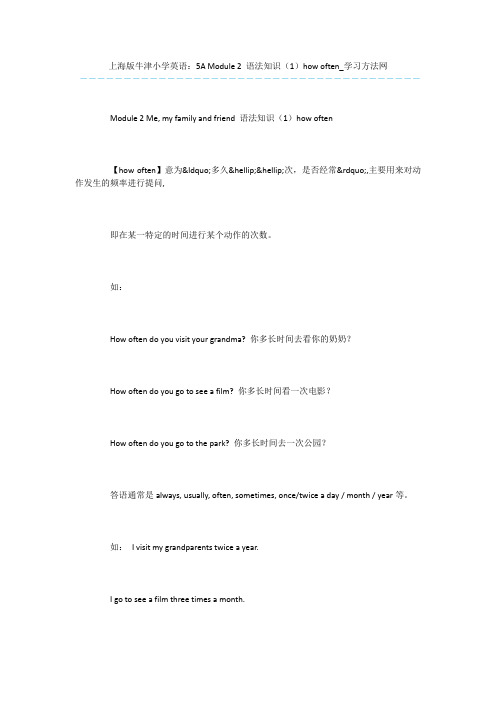
上海版牛津小学英语:5A Module 2 语法知识(1)how often_学习方法网
---------------------------------------Module 2 Me, my family and friend 语法知识(1)how often
【how often】意为“多久……次,是否经常”,主要用来对动作发生的频率进行提问,
即在某一特定的时间进行某个动作的次数。
如:
How often do you visit your grandma? 你多长时间去看你的奶奶?
How often do you go to see a film? 你多长时间看一次电影?
How often do you go to the park? 你多长时间去一次公园?
答语通常是always, usually, often, sometimes, once/twice a day / month / year等。
如:I visit my grandparents twice a year.
I go to see a film three times a month.
【练一练】
___do you visit your grandparents? I visit them twice a month.
A. How long
B. How many
C. How often
D. How soon
感谢阅读,欢迎大家下载使用!。
七年级英语下册词法语法手册Module2Whatcanyoudo复习素材新版外研版_
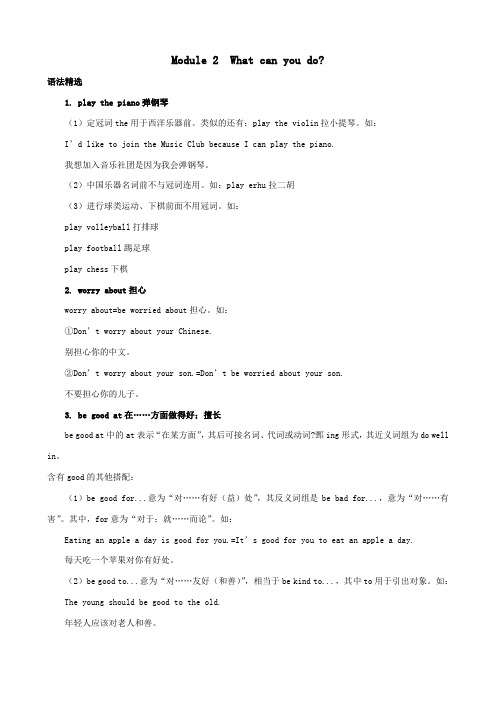
Module 2 What can you do?语法精选1. play the piano弹钢琴(1)定冠词the用于西洋乐器前。
类似的还有:play the violin拉小提琴。
如:I’d like to join the Music Club because I can play the piano.我想加入音乐社团是因为我会弹钢琴。
(2)中国乐器名词前不与冠词连用。
如:play erhu拉二胡(3)进行球类运动、下棋前面不用冠词。
如:play volleyball打排球play football踢足球play chess下棋2. worry about担心worry about=be worried about担心。
如:①Don’t worry about your Chinese.别担心你的中文。
②Don’t worry about your son.=Don’t be worried about your son.不要担心你的儿子。
3. be good at在……方面做得好;擅长be good at中的at表示“在某方面”,其后可接名词、代词或动词?鄄ing形式,其近义词组为do well in。
含有good的其他搭配:(1)be good for...意为“对……有好(益)处”,其反义词组是be bad for...,意为“对……有害”。
其中,for意为“对于;就……而论”。
如:Eating an apple a day is good for you.=It’s good for you to eat an apple a day.每天吃一个苹果对你有好处。
(2)be good to...意为“对……友好(和善)”,相当于be kind to...,其中to用于引出对象。
如:The young should be good to the old.年轻人应该对老人和善。
句法精析I think she’d like to join the Dance Club because she can dance really well.我认为她想加入舞蹈俱乐部,因为她跳得真的很好。
外研版高一英语课本语法梳理(必修1-5):Module 2(含解析)

外研版高一必修一Module 2【教材同步一点通】【要点梳理,不容错过】【能力提升】【Exercise】1.Jiaxing is such a beautiful city that it is well worth _____.A.visitB. visitingC. visitedD. to visit2.I still remember _____ to The Famen Temple and what I saw there.A.to takeB. to be takenC. takingD. being taken3.-----What would you rather ______?-----I’d prefer _____ a cup of tea, if possible.A.have ;to haveB. to have ;havingC. to have; to haveD. having;to have4.George is going to talk about the geography of his country,but I’d rather he ____ more onits culture.A.focusB. focusedC. would focusD. had focused5.(2012黑龙江大庆模拟)Most of what has been said about the Smith is also______the Johnsons.A.true toB. true ofC. the same ofD. true with6.It doesn’t matter ______ you pay by cash or credit card in this store.A.howB. whetherC. whatD. Why7.Don’t worry ; the guide will tell you how to avoid ______ ill while travelingA. to getB.being gottenC. gettingD. to be getting8.---- I usually go there by train.----- Why not ______ by boat for a change?A.to try goingB. trying to goC. to try and goD. try going9.I find painting and listening to music _______.A.relaxingB. is relaxingC. relaxedD. are relaxed10.I prefer ____ the movies rather than _____ at home.A. go to; stayB. to go to,stayC. going to ;stayingD.to go to;staying【能力提升】1.我宁愿待在家里而不愿外出。
外研版七年级英语下册module2 what can you do知识点归纳

模块2 What can you do知识点归纳知识点一:模块2的短语1.would like to do sth . 想要做某事2.join a club参加俱乐部3.play the piano弹钢琴4.worry about 担心,担忧5.teach sb. sth. 教某人某事6.get on well with ... 与……相处融洽7.be ready to do sth . 乐于做某事8.promise sb. sth.承诺/保证某人某事9.be good at擅长做某事10.do cleaning 打扫卫生知识点二:重点词语解释Unit one1.would like to do sth . 想要做某事eg:I would like to go there with you.我想跟你一起去那里。
would like常缩写为’d like。
would没有人称和数的变化。
其用法如下:eg:Mike would like some bananas. 迈克想要一些香蕉。
We’d like to watch TV. 我们想看电视。
I’d like Lingling to go with me. 我想让玲玲跟我去。
2.join v.参加,加入到……之中eg:Would you like to join the Football Club, Kate? 凯特,你想加入足球俱乐部吗?join 指加入某党派、某组织或某社会团体或某一人群中,成为其中的一员。
Will you join us for dinner?你和我们一起吃饭好吗?take part in 指参加群众性活动、劳动、游行等,有时可与join in互换。
Will you take part in the English evening? 你会参加英语晚会吗?3.play the piano弹钢琴当play后面跟某种乐器名词时,表示乐器的名词前要加the;当play后面跟球类或棋类名词时,其前不加任何冠词。
新版外研社Module2课文翻译与语法总结

Module2 What can you do? Unit 1 can play the piano.Daming :看!这个学期的社团都在这块版上了。
因为我可以弹钢琴所以我想参加音乐协会。
Betty ,你呢?Betty :我喜欢炒菜,所以我可以参加食物饮料俱乐部。
Daming ,你会炒菜吗?Daming :不,我不会。
当然,我会炒鸡蛋,但也是这么多了。
那么Lingling 呢?她可以加入什么协会呢?Betty :因为她跳舞非常好,所以我认为她将要加入舞蹈协会。
Tony ,你呢?Tony :我想加入普通话协会。
我讲普通话不好。
Daming :别担心你的普通话。
我们会教你。
因此,去选择你最喜爱的协会吧。
Tony :那好吧。
我打乒乓球,那我就选择乒乓球俱乐部。
那是我最喜欢的。
重要语法1.定冠词the 用于西洋乐器前(民族乐器前不加)play the piano 弹钢琴 play the violin 拉小提琴 中国乐器名词前不与冠词连用:play erhu 拉二胡 进行球类运动、下棋不用冠词:play basketbal 打篮球 play volleyball 打排球 play chess 下棋2. would like 意为“想要”,其语气比用like 婉转些。
3. that ’s all 没事;没什么;没有(别的)办法;……就这些4. Don ’t worry about Chinese. 别担心中文。
worry about = be worried about 担心 5. like + doing 喜欢做。
6. I think … 我认为。
think of 想起… think about 考虑Unit 2 I can run really fast.新学期的开始,我们正在选择我们的班干部。
我想要担任我们班的班长。
我与同学们和老师们都相处得都很融洽。
我很努力而且我在学校里也表现得很好。
我很随和也时刻做好去帮助别人的准备。
专题03 Module 2 语法Grammar 情态动词can的用法-七年级英语下册单元重难点易错

班级姓名学号分数Module 2 What can you do?Grammar 情态动词can的用法(时间:100分钟,满分:100分)一、单项选择(本大题共40小题,每小题1.5分,共60分)1.(2021·江苏·无锡市锡山区教师发展中心七年级期末)— Could I keep the windows________? There are too many people in the room.— Of course you ________. It is important to let the fresh air in.A.open; could B.closed; can C.open; can D.closed; could 2.I ________ ride a bike, but I ________ drive a car.A.can, can B.can’t, can’t C.can, can’t 3.(2019·新疆奇台·七年级期末)— Can your sister sing this song ?—Yes,she .A.can B.do C.does D.is 4.(2020·江苏·苏州市吴江区盛泽第二中学七年级期末)— ______ you help me with my homework?— Of course if I ______.A.Could; could B.Can’t; can C.Could; can D.Can; could 5.— Can your brother ________? —Yes, he________.A.play the chess; can B.play chess; canC.play chess; is D.play the chess; is6.Tony can ________ the guitar. Now he ________ the guitar.A.play; plays B.playing; playing C.plays; is playing D.play; is playing 7.(2018·山东·青岛市崂山区育才学校七年级开学考试)Ms.Wang is friendly. She________good with all the students at school.A.can do B.can be C.be D.can is 8.(2019·安徽·合肥市第四十五中学七年级期中)—________ I borrow the books from the library, Miss Yang?—Sorry, you________. These books are only for members of the English Club.A.Can; couldn’t B.Could; can’tC.Could; couldn’t D.Can; needn’t9.(2018·福建·厦门一中七年级期中)— What are the school rules?— We________listen to music in class.A.don’t B.can’t C.aren’t10.Betty is busy with her homework, so she ________ come with us tomorrow. A.can’t B.canC.is D.isn’t11.—What ________ Maria ________?—She can sing.A.do; do B.can; do C.does; do D.do; does 12.—Can you and Tom draw?—________.A.Yes, I can B.No, he can'tC.Yes, we can't D.No, we can't13.She ________ Chinese and she can also ________ a little English.A.speak; speaks B.speak; speak C.speaks; speak D.speaks; speaks 14.Can the boy ________ in English?A.sing B.sings C.to sing D.singing 15.—Can Bill and Jill sing and dance?—__________.And they do very well.A.Yes,they can B.No,they can'tC.Yes,they do D.No,they don't16.—Can Li Xin do Chinese kung fu?—__________,but he can play Chinese chess.A.Yes,he can B.No,he can'tC.Yes,he does D.No,he doesn't17.—Can you swim?—__________.It's very easy.A.Yes,I do B.Sorry,I can'tC.Yes,I can D.No,I can't18.I ________ ride a bike, but I ________ drive a car.A.can; can B.can't; can'tC.can; can't D.am; am not19.(2019·浙江浙江·七年级期中)—Can you walk on your hands?—Yes, I ________, but not very ________.A.can't, well B.can, good C.can, well D.can't, good 20.(2019·浙江浙江·七年级期中)——Can you Play the erhu?——________.And I ____play the piano, too.A.Yes, I can; can B.No, I can't; can't C.No, I can't; can D.Yes, I can; can't 21.(2019·福建·莆田第二十五中学七年级期中)—? —Yes, B-O-O-K, book. A.Can you spell it B.How do you spell it C.What is this22.—he speak English?— Yes, he can.A.Do B.Does C.Is D.Can 23.(2019·全国·七年级单元测试)Jane_______swim in the past, but now she_______ .A.can; may B.couldn't; can C.can't; could D.can't; couldn't 24.(2019·北京·七年级课时练习)Excuse me. Can you please tell mewhere get a digital camera?A.can I B.do I C.I can D.I do25.I want to join the swimming club, but I _______swim.A.can't B.can C.don't D.aren't 26.(2018·新疆且末·七年级期末)She can English.A.speaking B.speak C.speaks D.to speak27.I ride a bike, but I drive a car.A.can; can B.can’t; can’t C.can’t; can D.can; can’t 28.— Can you swim?—.A.No, I’ m not B.Yes, I am C.No, I can’t D.Yes, I can’t 29.—Is that Mr. Zhou?It be him. He has gone to Beijing.A.may B.can C.can’ t30.(2019·全国全国·七年级课时练习)— I can't climb mountains in the rain.— I _________ climb mountains,either.A.can't B.can C.aren't D.are 31.(2018·河南南召·七年级期末)I read little English when I was 10 years old, but now I read a lot.A.can; can B.could; could C.could; can D.can; could 32.(2019·重庆开州·七年级期末)Judy play the guitar now, but she play it two years ago.A.could, can B.can, could C.couldn't, can D.can, couldn't 33.(2019·广东·佛冈县潖江中学七年级单元测试)— _____ Alice perform ballet two years ago?—No, she _____ . But now she _____ .A.Can; can’t; could B.Could; can; canC.Could; couldn’t; could D.Could; couldn’t; can34.(2019·新疆·七年级期中)The little boy _______ play the piano. But he can singsongs_________ .A.can, good B.can’t, well C.can’t, good D.can,well 35.(2019·贵州·普安县三和学校七年级单元测试)___she ____ Chinese ?A.Do ,speak B.Does , speaks C.Can, speaks D.Can, speak 36.(2019·全国·七年级单元测试)I can play the guitar and I ___also play the drums. A.can’t B.can C.do D.don’t 37.(2019·广东·陆丰市民声学校七年级期中)Mom, can I watch TV now? -____.You must do your homework.A.Sure B.No, you don’t C.Yes, you can D.No, you can’t 38.(2019·广东东莞·七年级阶段练习)—Can I use your telephone, please?—No, you ________.A.can B.do C.can't D.don't 39.(2019·全国·七年级课时练习)-May I take this book out?一No,you .A.can't B.could notC.needn't D.aren't40.(2019·新疆新疆·七年级期中)We_______noisy or eat in class at school.A.can B.can’t be C.can’t D.can be二、完成句子(本大题共10小题,每小题2分,共20分)41.我会说英语,并且我也会踢足球。
Module2 My home town and my country 知识点语法总结归纳
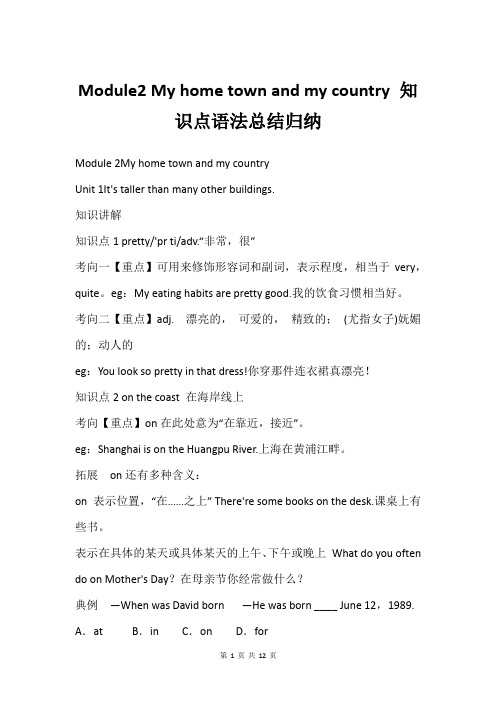
Module2 My home town and my country 知识点语法总结归纳Module 2My home town and my countryUnit 1It's taller than many other buildings.知识讲解知识点1 pretty/'pr ti/adv.“非常,很”考向一【重点】可用来修饰形容词和副词,表示程度,相当于very,quite。
eg:My eating habits are pretty good.我的饮食习惯相当好。
考向二【重点】adj. 漂亮的,可爱的,精致的;(尤指女子)妩媚的;动人的eg:You look so pretty in that dress!你穿那件连衣裙真漂亮!知识点2 on the coast 在海岸线上考向【重点】on在此处意为“在靠近,接近”。
eg:Shanghai is on the Huangpu River.上海在黄浦江畔。
拓展on还有多种含义:on 表示位置,“在……之上” There're some books on the desk.课桌上有些书。
表示在具体的某天或具体某天的上午、下午或晚上What do you often do on Mother's Day?在母亲节你经常做什么?典例—When was David born —He was born ____ June 12,1989. A.at B.in C.on D.for【点拨】表示在具体的某一天用介词on。
on 表示“放映,上演” What's on at the cinema tonight?今天晚上电影院上演什么?表示电器在使用中Look!All the lights are on.看!所有的灯都亮着。
相当于about,意为“关于” a book on radio一本关于无线电的书知识点3 in fact 事实上,实际上eg:No one believed it, but in fact, Mary did pass her exam.没有人相信这件事,但实际上玛丽确实考试及格了。
外研社小学英语一年级起点四年级下册 Module2 单词学习+语法复习

颜色 colour
Module2 语法复习
陈述句变一般疑问句
陈述句和一般疑问句的区别
陈述句:末尾是句号的句子 一般疑问句:末尾是问号的句子,翻译为“...吗?”
她是漂亮的。 She is beautiful. 她是漂亮的吗? Is she beautiful ?
他是有用的。 He is helpful. 他是有用的吗? Is he helpful?
Байду номын сангаас
这座房子很大。 This house is big. 这座房子很大吗? Is this house big ?
陈述句怎么变一般疑问句
1.be动词(am/is/are)提前 2.剩余部分抄写下来 3.句号变问号
把下面的陈述句变成一般疑问句,并翻译一般疑问句
1.It is pink.
Is it pink?
它是粉红色的吗?
2.She is clever. Is she clever? 她聪明吗?
3.They are tall. Are they tall? 他们高吗? 4.Xiaoyong is nice. Is Xiaoyong nice? 小勇好吗?
谢谢观看
Module2 单词学习+语法复习
动词
发送 send
花费(金钱) cost
形容词
漂亮的 beautiful
大的 big
有用的 helpful
粉色的 pink
蓝色的 blue
自然拼读:ch、ea
便宜的 cheap
贵的 expensive
其他词
邮件 email
自然拼读:ai
元 yuan
七年级上册英语module2知识点
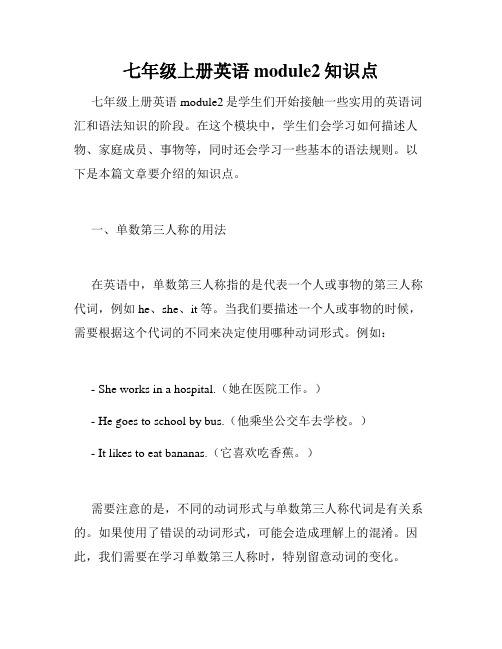
七年级上册英语module2知识点七年级上册英语module2是学生们开始接触一些实用的英语词汇和语法知识的阶段。
在这个模块中,学生们会学习如何描述人物、家庭成员、事物等,同时还会学习一些基本的语法规则。
以下是本篇文章要介绍的知识点。
一、单数第三人称的用法在英语中,单数第三人称指的是代表一个人或事物的第三人称代词,例如he、she、it等。
当我们要描述一个人或事物的时候,需要根据这个代词的不同来决定使用哪种动词形式。
例如:- She works in a hospital.(她在医院工作。
)- He goes to school by bus.(他乘坐公交车去学校。
)- It likes to eat bananas.(它喜欢吃香蕉。
)需要注意的是,不同的动词形式与单数第三人称代词是有关系的。
如果使用了错误的动词形式,可能会造成理解上的混淆。
因此,我们需要在学习单数第三人称时,特别留意动词的变化。
二、形容词的比较级和最高级形容词是描述一个人、事物或状态的词语,在英语中有原级、比较级和最高级三种形式。
在比较级中,我们需要获得两个对象的比较才能使用。
例如:- My cat is bigger than your cat.(我的猫比你的猫大。
)- This book is more interesting than that book.(这本书比那本书更有趣。
)在最高级中,我们需要比较三个及以上的对象才能使用。
例如:- This is the highest building in this city.(这是这座城市中最高的建筑。
)- He is the smartest student in our class.(他是我们班级最聪明的学生。
)需要注意的是,在比较级和最高级中,形容词的变化与不规则动词的变化一样需要我们认真学习,才能运用自如。
三、数量词和物主代词数量词和物主代词是英语中比较基础、同时也比较常见的词汇。
Module2外研版英语九年级上册模块语法详解与训练
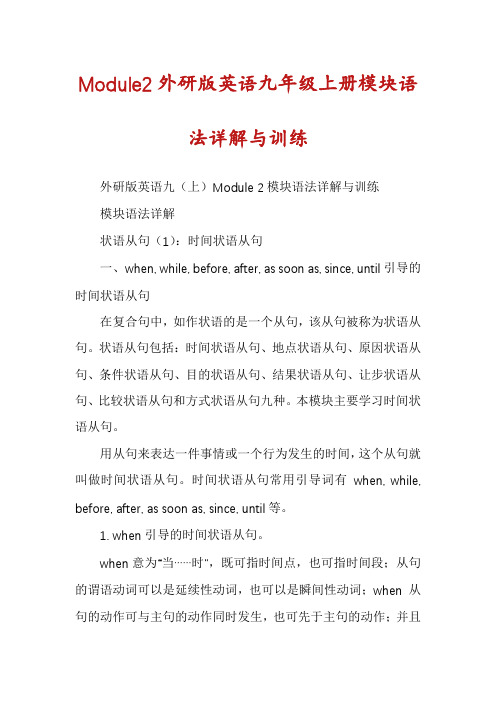
Module2外研版英语九年级上册模块语法详解与训练外研版英语九(上)Module 2模块语法详解与训练模块语法详解状语从句(1):时间状语从句一、when, while, before, after, as soon as, since, until引导的时间状语从句在复合句中,如作状语的是一个从句,该从句被称为状语从句。
状语从句包括:时间状语从句、地点状语从句、原因状语从句、条件状语从句、目的状语从句、结果状语从句、让步状语从句、比较状语从句和方式状语从句九种。
本模块主要学习时间状语从句。
用从句来表达一件事情或一个行为发生的时间,这个从句就叫做时间状语从句。
时间状语从句常用引导词有when, while, before, after, as soon as, since, until等。
1. when引导的时间状语从句。
when意为“当……时”,既可指时间点,也可指时间段;从句的谓语动词可以是延续性动词,也可以是瞬间性动词;when 从句的动作可与主句的动作同时发生,也可先于主句的动作;并且when有时意为“就在那时”。
如:When I got home, he was watching TV. 当我到家的时候,他正在看电视。
I was about to go out when the telephone rang. 我刚要出门,就在那时电话铃响了。
2. while引导的时间状语从句。
while只能指时间段,而不能指时间点;从句的动作或与主句的动作同时发生,或主句的动作是在从句动作的过程中发生的;从句中的动词必须是表示延续性动作或状态的动词。
如:While he was waiting for a bus, he was reading a newspaper. 他一边等车一般看报。
He visited a lot of places while he was traveling. 他在旅途中参观了许多地方。
外研社小学英语一年级起点四年级下册 Module2 单词练习+语法练习

Module2 单词练习+语法练习
一、根据句子的中文含义填写单词
1.I can _______ an ______ to you.
我可以发送一封邮件给你。
2.It _______s one hundred and eight _______.
它花了108元。
3.This bag is _______.
这个书包是蓝色的。
4.These flowers are _______.
这些花是粉色的。
5.This pen is _______.
这只钢笔是便宜的。
6.This football is _______.
这个足球是贵的。
7.What ______?
什么颜色?
二、判断这些单词划横线部分的自然拼读是否一致,一致打✔,不一致打×
三、把下面的句子从陈述句变成一般疑问句,并且翻译一般疑问句。
举例:
She is nice.
一般疑问句:Is she nice?
中文:她友好吗?
1.It is cheap.
一般疑问句:
中文:
2.This pen is expensive.
一般疑问句:
中文:
3.This flower is beautiful.
一般疑问句:
中文:
4.The bag is blue.
一般疑问句:
中文:。
Module 2 语法课

Module 2 Unit 3 Language in use.语法课一、教学目标:1.知识目标:动词can表示能力的肯定、疑问与否定形式。
This,these的用法。
2.能力目标:能在同学之间进行真实的相互介绍,主要涉及父母、朋友的职业及擅长活动等。
3.文化意识:了解不同国家的语言差异,从拼写中判断是哪种语言。
二、教学重点:1.情态动词can的用法。
2.these的用法及名词复数。
三、教学难点:情态动词can的用法四、教学过程:(一)情景导入These are Betty’s parents.This is Daming’s father.I can play football.Tony cant’t swim.Can you ride a bike?Y es, I can. No, I can’t.(二)精讲规则1.these 和this 的用法these 和this 都是指示代词,this 是单数,意为“这个”;these 是复数,意为“这些”。
用these时,所有可数名词用复数。
Eg:This is my father.These are my parents.2.情态动词can在表达“某人能做某事”时,可以用“can+动词原形”表达。
如果表达自己不能做某事,可以在can后直接加not,所写为can’t。
Eg:I can sing.I can’t play football.can是情态动词,没有人称和数的变化。
eg:Daming can ride a bike.She can play the piano.否定形式在can后加not,可以缩写为can’t.eg:I can’t ride a horse.询问某人能不能做某事,用can的疑问形式,即将can提至句首。
eg:Can she speak Chiese?Y es, she can.No, she can’t.(三)专项训练Task 1 :Look at the picture in the screen. Write sentences. Use This is or These are.eg:This is Tony’s father.These are Lingling’s parents.______________________________________________________________________________________________________________________________________________________________________________________________________________________________________Task 2:Look at the information. Ask and answer.eg :Betty can speak English.Betty can’t speak Chiese.Task 3:Look at the pictures in the screen. Fill in the blanks.1.______ Daming play football ? ______, he ______ .I ______ play football.2.______ Daming ride a bike?______ , he ______ . I ______ ride a bike.3.We ______ speak Chiese.4.We ______ play table tennis.(四)综合运用Talk about your family photo.。
- 1、下载文档前请自行甄别文档内容的完整性,平台不提供额外的编辑、内容补充、找答案等附加服务。
- 2、"仅部分预览"的文档,不可在线预览部分如存在完整性等问题,可反馈申请退款(可完整预览的文档不适用该条件!)。
- 3、如文档侵犯您的权益,请联系客服反馈,我们会尽快为您处理(人工客服工作时间:9:00-18:30)。
C. not making
D. not to make
13
GRAMMAR 2 Adverbial clause of result(结果状语从句)
so… that… 和such (a, an) … that …引导 的结果状语从句
What kind of words follow so? adj. / adv. What kind of words follow such? n.
• It was___that he couldn't finish it by himself. • A. such difficult work B.so difficult a work • C.such a difficult work D.so difficult work
• Bill had___many falls___he got black and blue all over. • A.such; that B.so; as • C.as; as D.so; that
having a hard time.(2002年上海春季高考)
A. settled
B. settling
C. to settle
D. being settled
12
3.The teacher asked us___so much noise. (2003北京春季高考) A.don't make B. not make
• 2. So hard did he study that he could easily pass the examination. • 3. She is such a lovely girl that all her classmates like her.
•
Page12
Homework • Please change the sentences from exercise 2 in grammar 2 into the inverted sentences.
14
Could you finish the sentences below? (Open answers) dangerous 1. Taking drugs is so ____________! badly 2. They are behaving so _________! unhappy boy. 3. Adam was such an _______ nervous that they call the 4. Some people feel so _________ police. drug that he nearly died. 5. It was such a dangerous ____ loud musБайду номын сангаасc that we couldn’t hear 6. It was such _____ ourselves speak. Can you make a conclusion out of these?
• 我戒烟是为了避免得心脏病。 • I stop smoking so as not to have heart disease.
3
Complete these sentences with so as (not) to or in order (not )to .
1. She stopped smoking in order to / so as to _____________________ be fit. 2. He read the article about cocaine in order to / so as to _________________learn about the problem. 3. The government put up the price of in order to / so as to cigarettes _____________________stop people buying them.
注意: “so+adj/adv 与such+n(名词) 位于 句首时,主句要用部分倒装。部分倒 装就是把句子中的be动词或者助动词 提到主语之前。 1. He was so badly injured that he had to be sent to the hospital. So badly was he injured that he had to be sent to the hospital.
so … that 和 such (a, an)… that 用来引导结 果状语从句,意为“如此…以致于…”。
adj./adv. So+ adj. + a (n) + n.(可数单) much/little + n.(不可数) many/few + n.(可数复)
+ that clause
a (n) + adj. + n.(可数单) Such+ adj. + n.(不可数) +that clause adj.+ n.(可数复)
It was such a dangerous drug that he nearly died.
• She is such a good student that she is respected by all her students.
• He made __ fire that the room was quite warm. • A.so big B.such big • C.so big a D.such big a
15
Conclusion: • So is followed by adjectives / adverb: eg: so dangerous / badly / nerous • Such is followed by indefinite article + adjective + noun, where the noun is countable, or no article where it is uncountable. eg: such an unhappy boy / a dangerous drug / loud music
特别提示: 当little作“少”讲时,应用“so…that…”结 构。 so little food 如此少的食物 当little作“小”讲时,应用“such…that…” 结构。 such little children 如此小的孩子
Examples Some of them behave so badly that people call the police.
为了赶上其他人,她不得不努力学习。 To catch up with others she has to study hard. 他闯入房子是为了偷东西。 He broke into the house to steal Something.
2) 为了加强语气、更加突出目的性,
通常在to的前面加in order和so as, 构 成词组in order to ,和 so as to. 二者都 表示目的,都可译为“为了· · · · · · ,以 便· · · · · · ”。 注意:in order to 可用在句首和句中 而 so as to只能用在句中而不能用在 首。
16
1) so 的后面跟形容词或副词:
The night scene of the night was so beautiful that we didn’t want to come back at all.
2) such (a,an) 后面跟名词 They were such dangerous drug dealers that people had to ask the police for help.
. 我们快点以便能及时到校
Let’s hurry so as to/in oeder to go to school in time.
不定式的否定变法是直接在 to前加not
不 定 式 的 否 定 形 式
Examples
• 为了防止遗忘,我已经把它记下来了。 • In order not to forget, I have written it down.
11
1.____late in the afternoon, Bob turned off the alarm.
(2001年北京春季高考)
A. To sleep B. Sleeping C. Sleep D. Having sleep
2.With a lot of difficult problems ____,the newly-elected president is
Module 2
1
Module 2 No drugs Grammar
一、不定式作目的状语
1)英语中通常用不定式to do作目的状语, 这种结构形式可置于句首或句尾,通 常不必用逗号隔开,位于句首时通常 . 意为“为了· · · · · · ”;放在句尾是通常意 为“以便· · · · · · ,为了· · · · · · · ,来· · · · · · ”。
10
4. The police went to the house in order to / so as to ___________________arrest the drug dealer. 5. She doesn’t go out with people who smoke ________________________ in order not to / so as not to start smoking again.
